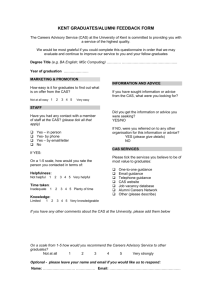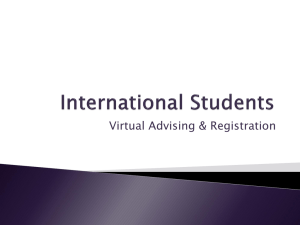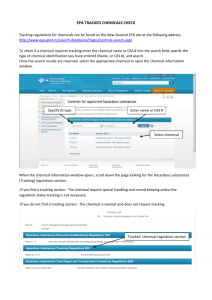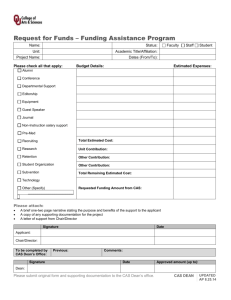college news - College of Arts and Science
advertisement
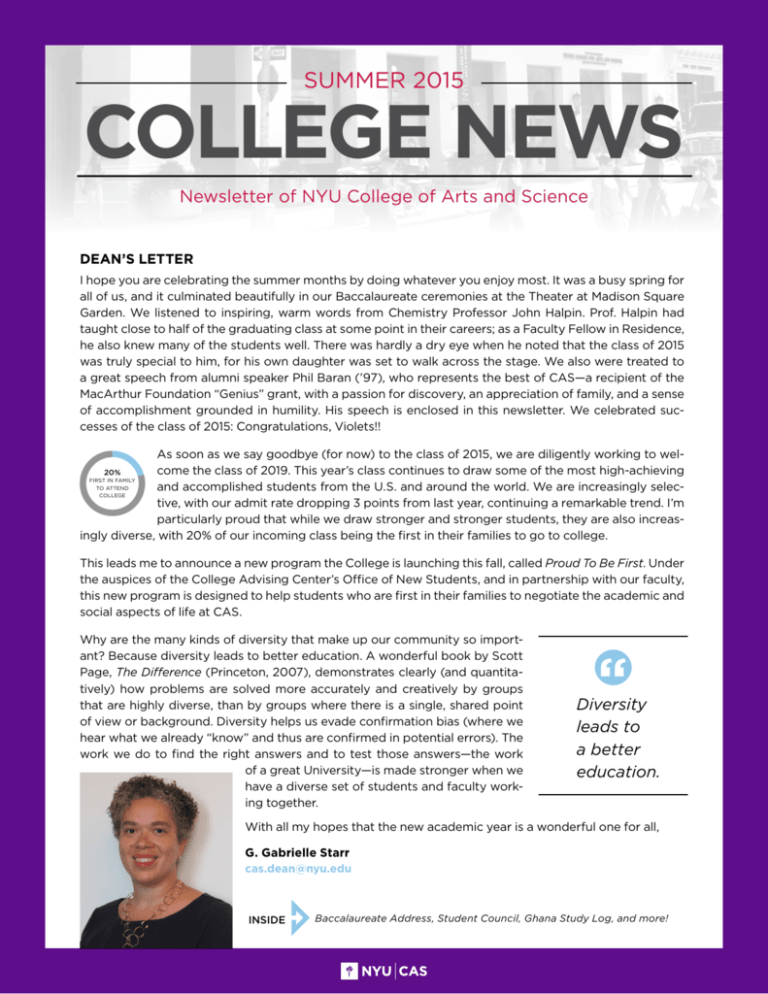
SUMMER 2015 COLLEGE NEWS Newsletter of NYU College of Arts and Science DEAN’S LETTER I hope you are celebrating the summer months by doing whatever you enjoy most. It was a busy spring for all of us, and it culminated beautifully in our Baccalaureate ceremonies at the Theater at Madison Square Garden. We listened to inspiring, warm words from Chemistry Professor John Halpin. Prof. Halpin had taught close to half of the graduating class at some point in their careers; as a Faculty Fellow in Residence, he also knew many of the students well. There was hardly a dry eye when he noted that the class of 2015 was truly special to him, for his own daughter was set to walk across the stage. We also were treated to a great speech from alumni speaker Phil Baran (’97), who represents the best of CAS—a recipient of the MacArthur Foundation “Genius” grant, with a passion for discovery, an appreciation of family, and a sense of accomplishment grounded in humility. His speech is enclosed in this newsletter. We celebrated successes of the class of 2015: Congratulations, Violets!! As soon as we say goodbye (for now) to the class of 2015, we are diligently working to welcome the class of 2019. This year’s class continues to draw some of the most high-achieving first in family to attend and accomplished students from the U.S. and around the world. We are increasingly seleccollege tive, with our admit rate dropping 3 points from last year, continuing a remarkable trend. I’m particularly proud that while we draw stronger and stronger students, they are also increasingly diverse, with 20% of our incoming class being the first in their families to go to college. 20% This leads me to announce a new program the College is launching this fall, called Proud To Be First. Under the auspices of the College Advising Center’s Office of New Students, and in partnership with our faculty, this new program is designed to help students who are first in their families to negotiate the academic and social aspects of life at CAS. Why are the many kinds of diversity that make up our community so important? Because diversity leads to better education. A wonderful book by Scott Page, The Difference (Princeton, 2007), demonstrates clearly (and quantitatively) how problems are solved more accurately and creatively by groups that are highly diverse, than by groups where there is a single, shared point of view or background. Diversity helps us evade confirmation bias (where we hear what we already “know” and thus are confirmed in potential errors). The work we do to find the right answers and to test those answers—the work of a great University—is made stronger when we have a diverse set of students and faculty working together. Diversity leads to a better education. With all my hopes that the new academic year is a wonderful one for all, G. Gabrielle Starr cas.dean@nyu.edu inside Baccalaureate Address, Student Council, Ghana Study Log, and more! BACCALAUREATE ADDRESS Professor John Halpin Dean Starr, fellow faculty, CAS administrators and staff, families and friends, and especially, the CAS graduating class of 2015, it is an honor to speak with you this morning. In fact, I consider the opportunity to address this class, the class of 2015, to be the greatest honor of my entire career. Because this class and I have a very special connection. I’ve taught General Chemistry to nearly half of you. But that isn’t it. I’ve lived in the same residence hall as hundreds of you. I’ve served breakfast, either at my home or at midnight breakfast, to hundreds of you too. And as for the rest of you, I’m sure we’ve shared a Silver Building elevator, probably all at the same time. But for one of you, well . . . “I AM YOUR FATHER.” Yes, my daughter Ellen—named for a mathematical function (the natural logarithm) and subjected to a childhood of listening to geeky jokes and nerdy puns—is a member of this class. No, I will never forget the class of 2015—though you can feel free to forget about me. of our curriculum. “If it doesn’t challenge you, it can’t change you”. You chose to change yourself from a relatively naïve, unskilled high school senior, into a thinking, reasoning, knowledgeable, creative young adult, ready for the next stage of life. I commend you for your choice. Now, no ceremony is complete without some “old guy (or gal)” advice. Try not to tune it out. Old folks got to be old by avoiding major mistakes. Happy old folks got to be happy by making the right decisions. Old folks feel compelled to talk about those choices, in hopes that your pathway can be a bit smoother than their own. Perhaps you can avoid some of the mistakes that we made. So please, humor me for a few minutes. I have attended many Baccalaureates, and I have listened to many faculty speeches. I have always been impressed by the eloquence and wisdom of English professors, professors of Classics, Historians, Journalists, and the occasional well-spoken scientist. But you have me. I am a teacher and a chemist, but words are not my The most strength. My biggest words are the names of chemical reagents. However, important I’m reasonably clear, and always concise (which, I suspect, you’ll appreciate benefit of today). education . . . Success. Success is not about money. Yes, you have to earn enough to live; you might need to support a family. That’s survival—not success. To be successful, to feel successful, satisfaction, day-to-day enthusiasm, and self-respect are what matter. I believe that the true test of success is to be able to look back - should the opportunity arise— and be able to claim that you made a positive difference to others. I too am a graduate of the NYU Colis the way it Education. The most important benelege of Arts and Science. Of course, fit of an education is not the ability to 31 years ago when I sat where you changes you. get a job (and make a lot of money— sit, the school had a different name. see above). It is the way that it changes And the Baccalaureate had a different you. Let me ask you—would you give location—Coles Sports Center, which back all of the knowledge, experience, and friendships meant no air conditioning. The school was called that you have acquired over the last four years for a Washington Square and University College, or WSUC. refund? That question is academic—in more ways When they changed the name, I was glad though, than one—because we don’t give refunds. Your expebecause it led to my favorite academic T-shirt slorience here at NYU is part of you now. You are not the gan of all time. “NYU College of Arts and Science . . . same person that you would have been had you not undecided since 1832”. come here. One of the things that shocked me when I took stock of my education, is the realization of how But you did decide. You chose to come to NYU, and much I don’t know. The depth, the breadth, the detail you chose a major, perhaps a minor. Maybe several. of the world, and of culture, can only be appreciated You completed a rigorous curriculum, and you did it in by attempting to learn about it. a crowded, noisy, unique environment. I recently heard continued a saying that resonated for me in terms of the rigor Which leads to. . . . Keep questioning. Answers are great. But they are the end of a process. A question is the start of the process, and it is the process that matters. It is life. Fortunately, when we arrive at an answer, it usually opens up a slew of new questions. That keeps life interesting. But it requires effort to remain inquisitive, to seek out new opportunities, and to stay hungry for knowledge. Stay hungry. Be kind. You’ve survived, and thrived, for four years in New York City. Many people—most non-New Yorkers, in fact—regard this as the epicenter of cold, rude, unkind behavior. You and I know that’s not true. Yet, I’m sure that at some point during your stay here in NYC, you’ve experienced that sort of treatment. It hurts. Let’s be better than that. After all, we are CAS! I could go on. But I won’t. You have better things to do today, and tomorrow. So enjoy these celebrations of your Be optimistic. graduation. Relish the experiences. But Reality. Be optimistic. Success awaits make sure to take it all in. Remember you. Yet there will be setbacks. Don’t Success awaits the sights, the sounds, and the friends dwell on them. Solve a problem, and you. you’re sitting with. Be grateful to your move on. Don’t second guess your family for helping you to get here. And decisions. Again effort is required. As a use your education to do good in the great British philosopher said, way back future. I congratulate each of you for being part of the in 1969, “You can’t always get what you want. But if you amazing, the awesome, CAS class of 2015! try real hard, you might just get, get what you need.” That was, of course, Sir Michael Philip Jagger. CAS Baccalaureate at Madison Square Garden, Tuesday, May 19, 2015 STUDY LOG CAS Journalism in Ghana Akwaaba! Welcome! It is hard to go far in Ghana without hearing this cheerful greeting. During the first six-week summer session in late May and June, students from across NYU participated in the Journalism in Ghana program at NYU Accra and were welcomed with characteristic Ghanaian warmth. The university’s well established West African outpost celebrated its tenth anniversary in 2014 and was home to students this summer as they explored Ghana’s history, culture and incredible stories. Led by Professor Frankie Edozien, journalist and NYU faculty, students in a variety of disciplines converged in Accra to expand their interests and sharpen their reporting skills. While visiting the group in early June, Noelle Marchetta, Associate Director of CAS Summer and Study Abroad Programs, had the pleasure of tagging along and getting a sneak peek at their work. As with other CAS Summer Abroad programs, academics form the core of the experience. Students take two courses, Reporting Africa and Journalism and Society, which together complement field work and inform a capstone project. The latter course is taught by a local instructor who prompts students to critically examine how African events are represented in the press, both locally and by western media; students are encouraged to look beyond the conventional African narrative to an authentically local perspective. By contrast, Reporting Africa is hands on, putting journalistic principles into practice and allowing students to explore interests in varied topics. Participants worked on collaborative pieces investigating the tourism industry, the energy crisis, or dumsor, and the sports boxing culture in the Bukom neighborhood. To learn more about students’ research and reporting in Ghana, check out the program’s dedicated publication, Africa Dispatch: http:// journalism.nyu.edu/publishing/africadispatch/. Participants worked hard but had ample opportunity to enjoy Ghanaian culture through the incredible people, music, food, and city atmosphere. With visits to the Black Star Square, Kwame Nkrumah Memorial, the international heritage site at Elmina Castle and Cape Coast, as well as a breathtaking canopy walk in Kakum National Park, students learned about Ghana’s colonial history and its rise as one of the first independent African nations. Another sponsored excursion to the Ashanti region in Kumasi and the northern regions near Tamale further informs students with a sense of the country’s varied history and diverse cultures. This program offers an incredible international perspective for any student—not only for budding journalists—interested in economics, public health, politics, history and education. For your amazing summer, check out Journalism in Ghana or one of the ten other CAS Summer Abroad programs: http://www.nyu.edu/admissions/summer-sessions/summer-abroad/programs.html. Ghana is waiting for you. This program offers an incredible international perspective for any student. THE LIBERAL ARTS: CRITICAL CONNECTING Young Alumni Trustee Profile How do you successfully shift from studying Goethe to specializing in biopharmaceutical competitive intelligence? In the case of Young Alumni Trustee Jessica Swartz (CAS ’00), the move was fluid thanks to the liberal arts environment she encountered at CAS as a Germanic language and literature major. For Jessica, being in NYC as an undergraduate encouraged her to interact “with a diverse community of students, professors and city residents helping to build confidence and worldliness and augmenting [her] perspective.” What was the single most important experience as an undergraduate? In aggregate, I would say that the relationships I built while at NYU were transformative and continue to significantly impact me today. I developed very strong friendships that are some of the most important in my life, and had the pleasure of experiencing professors who seemed to truly enjoy learning and teaching. Their enthusiasm, patience and lack of cynicism sincerely expanded my worldview. What did you do in the years following graduation? I had a wide variety of experiences and careers. Directly after college I became the general manager of a restaurant/lounge where I had bartended during college, and later transitioned to a similar role at a different lounge/club. I pursued this career for about 5 years, during which I went back to school to get my Master’s Degree in Psychology. After finishing my MA, I was accepted into the University of Maryland, Baltimore Neuroscience program and lived in Baltimore for 5 years working on my degree. I received my PhD in 2010 and began a career at IMS Consulting Group, a life sciences industry consulting firm. At IMSCG, I specialized in competitive intelligence, performing analyses of pharma/biotech products, portfolios, and pipeline strategy, environment and organizational monitoring and benchmarking, and was a senior therapy area leader in psychiatric disorders, neurology, rheumatology, pain, and GI. After 3.5 years at IMSCG, I transitioned to my current role in Pfizer’s Worldwide Research and Development (WRD) branch as a Director in SPS Competitive Intelligence. In addition to my career, I am the Vice-Chair of Women In Bio, a group dedicated to the professional development of women in the life sciences, and volunteer as a big sister through the Big Brothers Big Sisters organization. Tell us more about your work with Women In Bio— this is something we are focused on in the College, our Women in Science Group (WINS) was created a few years ago. I have always been interested in science and I read scientific books and magazines throughout my post-college career. I never considered pursuing science as a career, however, because as silly as this sounds, I was intimidated by the field. I had the perception that one needed to be a genius to study or work in the sciences and that one’s only career options were being a teacher or professor. This is one of the many reasons I am involved in Women In Bio: I would like to be part of the effort to help young women learn more about opportunities and careers in the sciences. We have a Young Women In Bio arm that aims to do just that through outreach to middle and high school girls. In addition to our YWIB efforts, our broader organizational mandate is to be an inclusive community that includes women at all stages of their careers, from graduate student to CEOs. I like to think that holding events with such disparate participants helps our members broaden their network and be exposed to careers and ideas about which they might not have otherwise known. What advice would you give a CAS student today? I would give this advice to any student today who doesn’t have a clear career path laid out before him or her: network. Speak to people in positions that interest you and ask questions, informational interview, go to networking events, take advantage of career counselors and learn as much as you can about what opportunities exist. In many cases, the most challenging way to get a job is by just applying. Our society increasingly relies on networks and relationships; the bigger of these you can build, the easier it will be, not only to secure an opportunity, but also to learn what opportunities may be out there. continued What was the role of the liberal arts in your career and intellectual evolution? Although I ultimately pursued a career in science, I truly believe I would have been disadvantaged without my liberal arts background. A strong liberal arts education, such as the one I had at NYU, provides a student with writing, critical thinking, and communication skills. When students learn how to study novels, poems, history or sociology, they learn to question dogma, stretch their perspectives, and understand the world through the eyes and experiences of others. I disagree with the opinion that the main purpose of a college education is to major in a subject that will directly translate to a high income earning job. I think there are many paths, including those through the liberal arts, to an enriching life and career. I believe my liberal arts education helped me gain comfort asking challenging questions and pursuing deeper answers, rather than being satisfied with an initial cursory response. In addition, every day I am asked to write documents, presentations, synopses, executive summaries, white papers, and so on. Spending a significant amount of my undergraduate education focused on writing has helped me work not only faster and more efficiently, but has helped me stand out, whether on resumes, with clients, with managers, or on project teams. Above all else, I cannot overemphasize the value of well-honed critical thinking skills. Understanding how to examine a problem or situation from every angle while acknowledging and reducing biases is invaluable. Critical thinking helps you in job interviews, in meetings, in idea generation. Critical thinking engenders respect from your peers and superiors, it endows authority, and, most importantly, it solves problems and innovates. Any opinions expressed in this interview are those of the individual and do not represent the views, opinions or policies of Pfizer. IMPORTANT DATES Fall 2015 Wednesday, September 2 Fall classes begin Monday, September 7 Labor Day (NYU holiday) Tuesday, September 15 Last day to add a class; waitlists expire Last day to drop a class without a “W” Monday, October 12 No classes scheduled (Fall Break) Tuesday, October 13 Legislative Day (all classes meet on Monday Schedule) Tuesday, November 3 Last day to Withdraw from a course Last day to elect or revoke Pass/Fail option Monday, November 16 Registration for Spring 2016 courses begins Wednesday, November 25–Friday, November 27 Thanksgiving Recess Tuesday, December 15 Last day of classes Wednesday, December 16 Reading Day Thursday, December 17–Wednesday, December 23 Examination period COLLEGE COHORT PROGRAM 2015–2016 Outlook With the start of the fall semester on the horizon, the College of Arts and Science is eagerly awaiting the arrival of the class of 2019. The College Cohort Program, in its fourth year, is also welcoming this year’s class of CAS College Leaders, upper-class mentors to first-year students, who will work with academic advisors to create and foster community among incoming class and help them acclimate to life at NYU. This year, the College Cohort Program is excited to announce changes to the Cohort Cup, an inter-cohort competition promoting student involvement within the NYU community. The Cohort Cup has now expanded its duration to run through the entire academic year, with a kickoff at CAS Convocation and ending at Spring Break. The competition also boasts a new website: cohortcup.cas.nyu.edu. On this user-friendly website students can learn about the Cohort Cup, find information on a diverse range of NYU events, post and view cohort photo submissions, check cohort standings, and more. The Cohort Cup ABOUT The College Cohort Program provides CAS students the opportunity to build a small community within CAS that is diverse in intellectual range, serves as a crucible for debate and scholarship, and fosters a welcoming and supportive home. competition will also include an inaugural classwide CAS Olympics Day, held in collaboration with CAS Student Council, at the Jerome S. Coles Sports Center in September. The College Cohort Program team is also excited to strengthen our Leadership Development Series for Sophomore Cohort Presidents. We will partner with offices across campus to train these student leaders in a variety of areas, including leadership styles, self-assessment, conflict resolution, working across difference, public speaking, and professionalism. The team will also work with Alumni Relations to connect these student leaders with alumni mentors. The Leadership Development Series, comprised of biweekly meetings, will focus on defining and understanding leadership in the fall semester and on developing leadership skills through workshops, mentoring sessions, and completion of a Capstone project in the spring semester. STUDENT COUNCIL UPDATE 2015–2016 Outlook Last year was an amazing one for us—from innovative programs to exciting collaborations, CAS Student Council ended the year strong, and we hope to keep the momentum going! My name is Rijul Asri (’16), and I am the current student-body President. I am excited to share our new philosophy and plans for the upcoming academic year. This year, we are committed to action. Our ACT philosophy stresses accessibility, collaboration, and transparency as tools to create the best student experience within our College. We are kicking off the year with Bun Week, our Fall Spirit Week. Vice President Rebecca K. Cruz (’16) and Class Presidents Juhi Patel (’16), Hamza Muhammad (’17), and Nicholas Cho (’18) have been hard at work planning the week to welcome back our peers. These kickoffs are the inaugural events of our Class Boards, a new collaboration between us and the College Cohort Program that gives students an even louder voice in shaping their experience. Part of this week is also our first-ever College Olympics, a competition between cohorts from the Class of 2019. We hope to strengthen the communities within cohorts while also building a sense of camaraderie and class spirit at this early stage in their NYU career. Treasurer Shela Wu (’18) is committed to improving club leadership by providing student leaders with more access to resources around NYU. She hopes to improve our connection to Club Presidents in order to create a more unified College network. Graphic Designer Sarah Bigler (’16) and Webmaster Neha Srivatsa (’16) are focusing on improving our public presence through varied marketing strategies and a brand new website. They hope to provide students with new ways to access information through social media outlets. Senator Amanda Ezechi (’17) advances her work with the Upstander Campaign as we move it to the university-wide Student Senators Council. This year’s Fall Dialogue will focus on sexual respect and the ways in which new policies affect the daily lives of students. Amanda will also work with her fellow Senators to address concerns such as transportation and technology services. Transfer Representative Daniella Haviv (’17) continues to define this new position through her efforts to build a robust transfer community. She plans on featuring New York City attractions in her programs to give transfer students the true NYU experience. Student Advocacy Chair Noah Bierbrier (’18) hopes to improve our connection to the student body and to better understand student opinion. He will concentrate on hosting panels and town halls as spaces for students to ask questions, voice opinions, and learn about policies. Stop by a General Assembly meeting (Tuesday nights at 6:30 in the Heights Alumni Lounge) and follow us on Facebook (NYU CAS Student Council) and Twitter (@NYUCASSC) to hear more! Students get to know their professors at the 12th Annual Student Faculty Banquet CAS ALUMNI RELATIONS College Alumni Association The College Alumni Association represents more than 75,000 graduates of Washington Square College, University College, the School of Engineering, and the present-day College of Arts and Science. This year’s NYU Alumni Day will take place on Saturday, October 24, 2015. Save the date and join us for the CAS Dean’s Luncheon at which Mark Knoller (ARTS ’73), CBS News White House Correspondent will be presented with the 2015 CAS Alumni Achievement Award. 75,000 number of graduates represented by the college alumni association A great way to hear about some of the phenomenal projects our alumni, students and faculty are working on is to subscribe to the NYU Arts and Science Alumni Blog. If you know of alumni, faculty or students who have a story that would make for an interesting blog feature, please feel free to contact us by email at cas.alumni@nyu.edu. The NYU CAS Alumni Association Facebook page and NYU CAS Alumni Linkedin Mark Knoller (ARTS ’73) Group are also wonderful resources for those looking to network and engage in conversations with each other and with the alumni office. Follow us on Twitter (@artsandscience) and Instagram (nyuartsandscience). ALUMNI RELATIONS STAFF Keep in touch and stay connected! Phone: (212) 998-6880 or email: cas.alumni@nyu.edu. Ann Marie Ladisa, Senior Director of Alumni Relations Evan Nisenson, Assistant Director of Alumni Relations Marta Wallien, Administrative Aide This office is responsible for all alumni efforts on behalf of the College of Arts and Science, Liberal Studies, and the Graduate School of Arts and Science. College News is a publication of the College of Arts and Science at New York University 100 Washington Square East, New York, NY 10003 http://cas.nyu.edu


